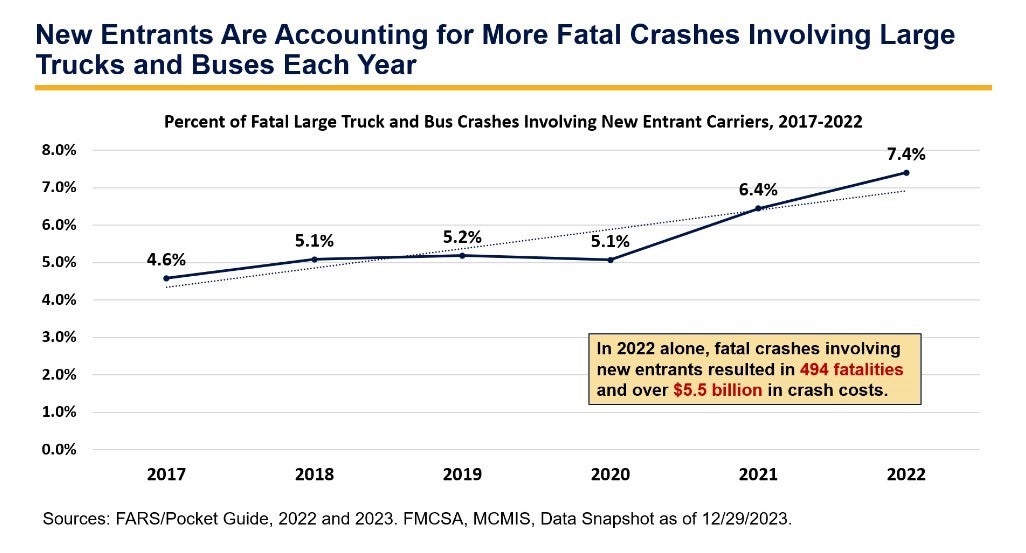WASHINGTON — Deaths resulting from large-truck crashes where newly licensed drivers are involved continue to rise, according to recent government data, but a proposed safety requirement that could help reduce those deaths will likely be delayed again.
The percentage of fatal large-truck and bus crashes involving new-entrant carriers climbed from 4.6% to 7.4% from 2017 to 2022, according to a snapshot of Federal Motor Carrier Safety Administration data taken at the end of 2023.
In 2022, those crashes resulted in 494 deaths and over $5.5 billion in costs.
“Unfortunately this trend continues among recent new-entrant program graduates,” said Kelly Stowe, an engineer with FMCSA, referring to the agency’s New Entrant Safety Assurance Program.

During FMCSA’s safety research forum on Thursday, Stowe presented a new internal agency analysis comparing crash rates for carriers that made it through the agency’s 18-month new-entrant program to crash rates of a control group of randomly selected established carriers of similar fleet size.
The data showed that motor carriers operating within 24 months of graduating from the new-entrant program had twice as many total crashes and nearly twice as many fatal crashes per 100 power units as established carriers.
“So even after completing [FMCSA’s] new-entrant program — which includes having to pass a safety audit — newer carriers are still getting in crashes at a higher frequency than more established carriers,” Stowe said. “If we can educate these carriers early on and make sure they understand the requirements and expectations before they begin operations, we can prevent some of these crashes from occurring.”
But Stowe acknowledged that despite the concerning trend, FMCSA has yet to establish a written proficiency exam, mandated by Congress in 2012, that must be passed before a motor carrier can be registered with the U.S. Department of Transportation. “The deadline for meeting this requirement was April 2014 — we’re 10 years late,” she said.
Stowe also noted that the timeline for a proposed rulemaking to establish the proficiency exam, which was scheduled to begin in July with publication in the Federal Register, “will likely slip. It’s a high-level work plan and it’s subject to change.”
While based on dated studies, there is evidence that such a requirement could significantly reduce injuries and fatalities involving new-entrant motor carrier crashes.
Stowe summarized findings from studies completed in 2006 and 2012 comparing companies undergoing training prior to receiving operating authority with control groups that did not.
Not only did trained-carrier drivers have much lower crash rates, but they also tended to “remain in business substantially longer,” Stowe said.
“We have an opportunity with this program to improve new-entrant motor carrier safety and hopefully carry those safety improvements over to the more established carrier population over time.”












Tim Kordula
So I look at the comments and the meat of the article and have to ask, is this a new carrier issue or a new driver issue.
Being part of an approved eldt cdl training school, we know what we are capable of producing as a driver. But the training doesn’t stop there. We also have a carrier division with a minimum 4 week finishing program. With that being said is a finishing program part of a new carrier entrant program? If not it should be, and it should be structured and not be limited to a certain number of weeks. Keep in mind all cdl drivers were “new” at one time.